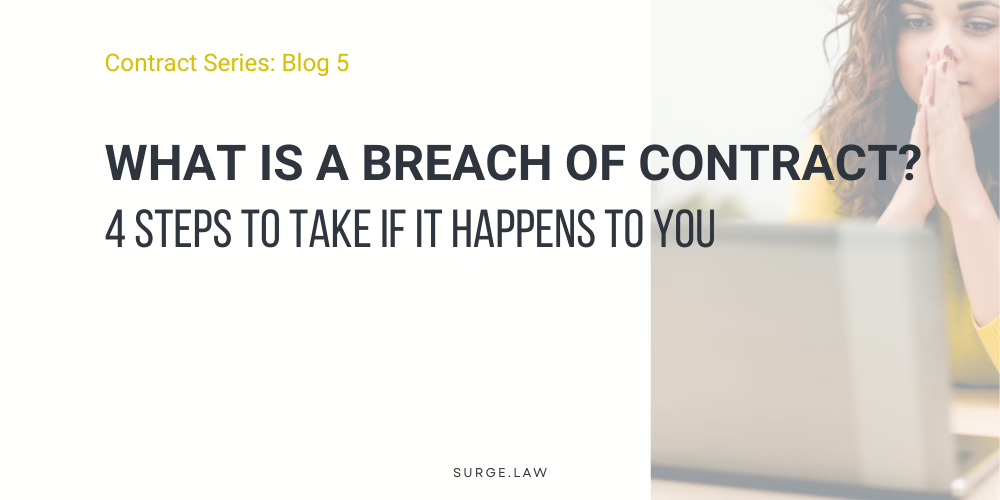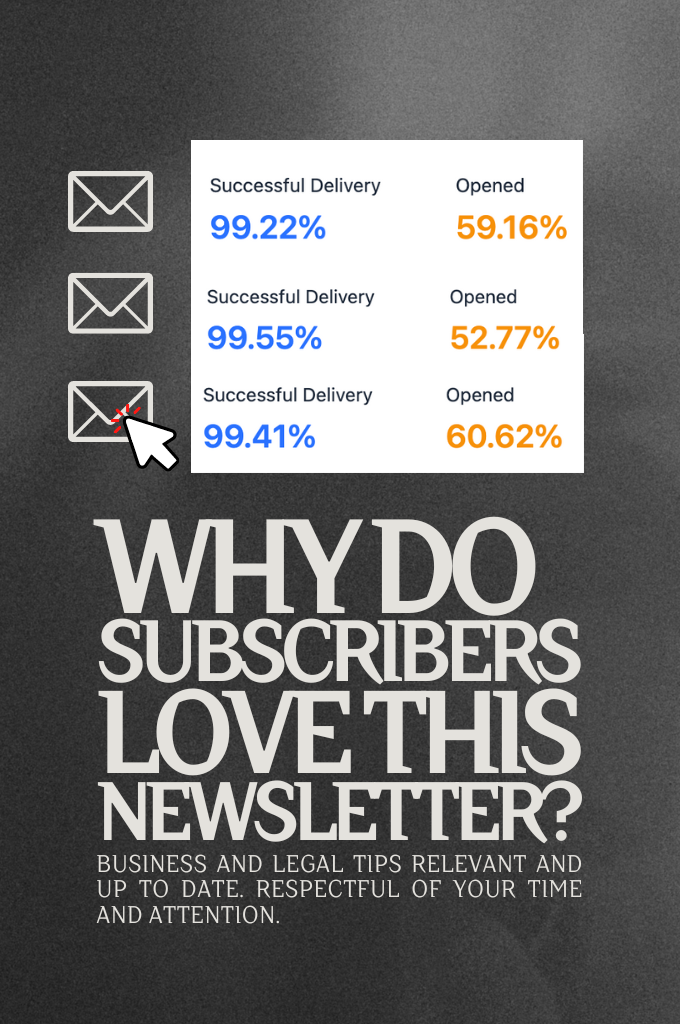What Is a Breach of Contract? 4 Steps to take if it Happens to You
Cornell Law School says, “A breach of contract occurs whenever a party who entered a contract fails to perform their promised obligations.” Put simply, breaching a contract is breaking a promise.
Because a breach of contract can cause loss of money, damage to relationships, and lawsuits, it’s important for business owners to understand more than just a definition.
In this blog, we’ll explain four types of contract breaches and what to do if a contract promise is broken. You will be more prepared to address problems for your business should they come your way.
What Exactly Is a Breach of Contract?
A breach occurs when someone in a contract fails to fulfill their agreed-upon responsibilities. For instance, let’s say you hire a contractor to build a website by a certain deadline, but they fail to deliver on time. This missed deadline is a breach because it goes against the terms you both agreed upon.
Common examples of contract breaches include:
- Failing to deliver agreed services: Such as when a service provider doesn’t complete their work.
- Incomplete or substandard work: Delivering a product or service that doesn’t meet the quality promised.
- Making false claims: Misrepresenting the nature or outcome of a service or product.
- Sharing confidential information: Violating a non-disclosure agreement (NDA) by leaking private details.
In each of these cases, the breach harms the other party, sometimes unintentionally. Because the innocent party didn’t receive the promise they were given in an agreement, they often suffer financial losses, expectation damages, and inevitably, trust problems. Any further partnership may be very difficult if one party was hurt by the other in a breach of contract.
What Are Expectation Damages?
When a breach occurs, the affected party may experience expectation damages—losses tied to what they reasonably expected to gain from the contract. It’s a fancy way of saying, any financial damages caused by the breach. In most cases, the breaching party becomes liable for these damages, which can be significant.
For example, imagine you own a restaurant and hire a contractor to install new kitchen equipment by a specific date. If they fail to install the equipment on time, causing your grand opening to be delayed, your financial losses (expectation damages) could include lost revenue and additional expenses. The contractor could be held responsible for these losses.
What Types of Breaches Should You Watch Out For?
While breaching a contract sounds clear and simple–a broken promise– that promise can happen in several forms to look out for.
Common types of breaches that business owners should be aware of:
Minor Breach
A minor breach is a small deviation from the contract’s terms that doesn’t greatly disrupt its primary purpose. While it’s technically a breach, it usually doesn’t justify ending the contract entirely. Here’s an example: if a contractor finishes a project but misses a minor detail that doesn’t impact the final outcome, it may be considered a minor breach. You could try to have the missed detail fixed without canceling the agreement.
Material Breach
A material breach is more serious and affects the core purpose of a contract. When this happens, the non-breaching party may be allowed to cancel the contract and seek compensation for any damages that resulted from the breach. For example, suppose you hired a designer to create a unique logo for your business, but they deliver a generic design copied from another client’s project. This breach undermines the purpose of the contract. You didn’t get a unique logo. Therefore you can justify canceling the contact. If damage was done because of the broken promise, you can see compensation for those things as well.
Fundamental Breach
A fundamental breach is a big and serious problem. It’s a violation that allows the non-breaching party to sue for damages and immediately terminate the contract. If you purchase software for your business, for example, and discover it doesn’t include essential features that were promised in the contract, you’re likely facing a fundamental breach. You may be entitled to terminate the agreement and seek compensation.
Anticipatory Breach
Sometimes, a party shows in some way that they won’t fulfill their obligations before it happens. This is known as an anticipatory breach, and the other party can usually seek compensation for damages immediately. Consider this example. If a supplier informs you a week before delivery that they won’t be able to meet their deadline, you can likely pursue legal action for any losses you’ll incur from the delay.
How to Respond When a Breach Happens
If you find out that a promise has been broken in one of your contracts, you need to take action quickly. Why? Depending on the purpose of your contract, taking action can mean the difference between a protected profits and processes and great damage.
So how should you respond when there’s been a contract breach? Here is a good place to start:
#1 Review the Contract Terms
Look carefully at the contract to make sure you know what obligations and terms deal with breaches or damages. Contracts often include predefined ways to set the breach right. Ideally, both parties–you and each party involved–have a good understanding of the terms of the contract and have agreed to it by signing. This takes out questions about whether they should be held accountable to the breaching terms in the contract. You can then proceed by carrying out the terms of the contract. We highly recommend contacting a business lawyer for dealing with these types of disputes. Unfortunately, sometimes the breaching party is unwilling to make things right, and filing a lawsuit is necessary.
#2 Gather Evidence
It’s a really good idea to keep any written communications, agreements, or evidence that show the breach and its impact on your business in a safe place. Documentation strengthens your case if you decide to pursue damages in court.
#3 Communicate with the Breaching Party
Sometimes, talking things through can resolve a breach without legal action. If possible, discuss the issue and suggest ways to fix it. Remember that having a business lawyer involved is highly advised as they give authority to your concerns and advise you on the best way to resolve a conflict, even helping you maintain a good relationship with the offending party.
#4 Seek Legal Advice
For more serious breaches, you need to consult a business lawyer quickly. Not doing this could allow breach damages to get worse. It could spell financial loss; damaged relationships with partners, suppliers, and customers; a degraded brand image; and problems affecting how your business operates. A business lawyer will guide you through your options if a contract breach happens. They give authority and advice. Expect to learn how to get compensated for damages, how to terminate the contract, if you should pursue a lawsuit and how.
Protecting Your Business from Breach of Contract
While breaches are sometimes unavoidable, clear and thorough contracts reduce the chances of misunderstandings or failures to meet expectations. When drafting a contract, specify essential terms, include quality standards, and outline what happens if either party breaches the agreement. The clearer your contract, the easier it will be to enforce if a breach occurs.
In Summary: Understanding and Handling Breaches of Contract
A breach of contract can disrupt your business, cause financial losses, and require time to resolve. Understanding what constitutes a breach, how to spot different types, and what to do when it happens is essential for any business owner. By acting responsibly when entering contracts, you can protect your interests and handle breaches confidently.
Learn more about contracts: Ready for a quick, easy-to-use guide on contracts? Our final blog in this 6-part contract series will cover the top contract tips from this series and more! It covers 21+ tips for contract writing, negotiating, and enforcing. We want you to be able to confidently promote and protect your business with contracts.
To get the full 6-part series delivered to your email inbox, sign up today. You’ll learn how to strengthen your business contracts and use them effectively.


